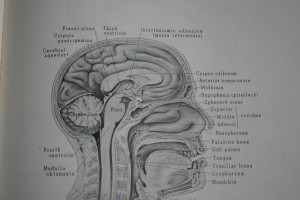3 Simple Ways to Beat Brain Aging
 You can see the outward effects of aging whenever you look in the mirror. While you can’t see the effects of aging on your brain, you can certainly notice the results.
You can see the outward effects of aging whenever you look in the mirror. While you can’t see the effects of aging on your brain, you can certainly notice the results.
Having brain fog and “senior moments” becomes commonplace. Losing car keys, forgetting important engagements, and not being able to come up with the right word happens more often.
We’ve been led to believe that “losing it” mentally by the time we reach our 60s is “normal”. Yet we also know of those who’ve stayed mentally sharp well into their 90s. So why settle for “normal”?
Let’s examine three ways that your diet accelerates brain aging and how you can easily reverse the trend.
Free Radical Damage
Free radicals are unattached oxygen molecules that attack your cells much in the same way that oxygen causes metal to rust. Free radicals are caused by everyday occurrences such as stress, lack of sleep, grilled meat, fried food, air pollution, and radiation from your cell phone and computer.
Even if you live a perfectly healthy lifestyle, you can’t avoid free radicals. Your brain uses a lot of oxygen – about 20% of all that you take in – and free radicals are a byproduct of breathing. It’s this heavy oxygen use that makes your brain particularly susceptible to free radical damage.
You can counteract free radical damage with antioxidants. Include lots of fruits and vegetables into your diet. Berries, coffee, and green tea are some of the best antioxidants you are likely to consume regularly.
If you know your diet isn’t that great, consider taking an antioxidant supplement. I recommend astaxanthin (a-sta-ZAN-thin). It’s one of the most potent antioxidants known – a whopping 6000 times more potent than vitamin C! (1) It’s particularly good at protecting your brain since it can easily cross the largely impermeable blood-brain barrier.
Astaxanthin naturally occurs in algae and is a brilliant red, fat-soluble carotenoid. It’s what makes salmon and flamingos their distinctive pink color. A fun fact is that flamingos are born white but turn pink as they eat astaxanthin-rich prawns, shrimp, and algae.
The best naturally occurring source of astaxanthin is krill oil. Krill are tiny crustaceans found in the cold, unpolluted waters of the Antarctic.
If free radicals are left unchecked they can trigger the next cause of cellular aging – inflammation.
Chronic Inflammation
Inflammation is your body’s first line of defense against infections, irritations, toxins, and foreign molecules. This process normally shuts down when the injury starts to heal.
But trouble can arise when the inflammation process gets stuck “on” and doesn’t know when to stop. Then inflammation can turn on your body, attacking healthy cells instead of protecting them. When this happens it’s considered “chronic”. Chronic inflammation has been dubbed a “silent killer”.
Indicators that you have chronic inflammation are allergies, IBS, high blood pressure, and arthritis (or any condition that ends in “itis”).
Chronic inflammation can affect brain function leading to brain fog, ADHD, ADD, anxiety, depression, memory loss, and ultimately Alzheimer’s.
The solution is to eat an anti-inflammatory diet – one that’s high in fruits, vegetables, healthy fats, wild salmon, and grass fed meat.
Avoid seed oils like canola, safflower, and sunflower. They are high in inflammatory omega-6 fatty acids. Switch to extra virgin olive oil and coconut oil instead.
Few would question the addition of olive oil to the diet, but coconut oil? This healthy oil got a bad rap for being a source of saturated fat, but is actually one of the healthiest foods for your brain. If you want to learn more I recommend you get a copy of Dr. Mary Newport’s book Alzheimer’s Disease – What if There Was a Cure? In it she chronicles how her husband’s Alzheimer’s improved when coconut oil was added to his diet.
Omega-3 Deficiency
Omega-3 essential fatty acids are needed to build brain cell membranes, reduce inflammation, and increase brain-derived neurotrophic factor (BDNF) which promotes new brain cell formation. BDNF is so potent it’s been called “Miracle-Gro for your brain”!
Omega-3s are hard to get exclusively from our modern diet. The best sources are oily fish like salmon and sardines (wild-caught only) and grass fed meat. Farm raised fish lacks omega-3s since their diet no longer includes naturally occurring omega-3 sources.
The other thing you can do is to balance your omega-3 to omega-6 intake. Unfortunately, the average American eats upwards of 20 times more of the 6s than of the 3s. It’s recommended we take in two to four times more 3s than the 6s. So you can see that most of us are way out of balance – by a factor of 40 to 80 or more!
Consider omega-3 supplementation. I prefer krill oil over fish oil. It’s specifically more helpful for your brain, because it more easily crosses the blood-brain barrier. It’s easier to digest and doesn’t have a fishy aftertaste. Krill oil is absorbed more efficiently than fish oil, too. (2)
Memory loss, depression, mood swings, dementia, Alzheimer’s disease, and attention deficit disorder have all been found to improve with omega-3 supplementation.
You probably noticed that these three causes of brain aging all have the same solution. Eat a diet high in fruits and vegetables, choose wild fish over farm raised, avoid vegetable oils, and supplement with a high quality krill oil plus astaxanthin supplement.
Deane Alban holds a bachelor’s degree in biology and has written about natural health for over 20 years. She is the author of Brain Gold: Brain Fitness Guide for Boomers, a step-by-step customizable program for preventing and reversing age-related mental decline. Discover the latest ways to protect your most valuable asset and stay mentally sharp for life at her website BeBrainFit.com.
